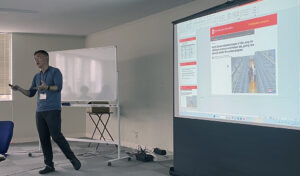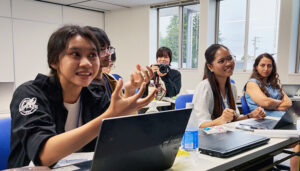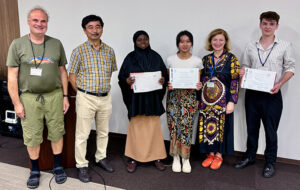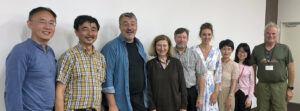IEEE NPSS Climate Change Workshop at Fukushima
An Inspiring Event on Energy, Education, and Innovation

On September 14th 2024, the Osaka University Office at Fukushima was the site of an impactful and forward-thinking event: the IEEE NPSS Climate Change Workshop, sponsored by the IEEE NPSS Climate Change Initiative preceded and followed by the Osaka University and the IEEE NPSS EduCom Schools (https://indico.rcnp.osaka-u.ac.jp/event/2388/overview).
This full-day program brought together students and professionals to address the pressing challenges posed by climate change, focusing on sustainable energy, nuclear science, and the dangers of misinformation. With forty students from diverse regions and academic backgrounds in attendance, the event represented an important platform for knowledge-sharing, dialogue, and creative problem-solving.
The Lectures: A Deep Dive into Energy and Information
The day began with a series of four lectures, each tackling a unique aspect of the climate change landscape. These lectures, delivered by leading experts in the fields of physics, nuclear science, and media literacy, covered a range of topics central to understanding both the opportunities and challenges in addressing global warming and energy sustainability.

- Energy and Sustainability: The first lecture, delivered by Cinzia DaVià, offered an overview of the current global energy landscape, emphasizing the importance of transitioning to renewable energy sources. Participants explored the complexities of energy consumption, the potential of renewables, and the urgent need for sustainable infrastructure to reduce carbon emissions.
- Nuclear Fission as a Clean Energy Solution: This lecture from Raymond Cao focused on nuclear fission, addressing both its potential as a low-carbon energy source and the challenges it presents in terms of safety and waste management. The speaker discussed advancements in reactor technology that make fission safer and more efficient, as well as the role it could play in meeting the world’s growing energy needs without exacerbating climate change.
- Fusion and Plasma Applications for Sustainability: Fusion, often regarded as the “holy grail” of energy, was the highlight of the third lecture delivered by John Verboncoeur. The presenter highlighted the latest breakthroughs in fusion research, outlining how it could provide virtually limitless clean energy if technological and financial barriers can be overcome. The talk provided a glimpse into the future of energy, and alternatives uses of plasma sparking excitement and curiosity among the attendees.
- Misinformation and Fake News: The final lecture from Barbora Gulejova, addressed a different but equally critical aspect of climate action: combating misinformation. In today’s information-saturated world, fake news and misinformation can create confusion, weaken public trust, and hinder climate action efforts. This session equipped students with tools to identify and counter misinformation, emphasizing the importance of media literacy in the fight against climate change.
Inspiring Student Presentations: Innovation in Action

In addition to the lectures, the IEEE NPSS Climate Change Day created a platform for student involvement by organising a competition amongst participants to present their own ideas for tackling climate change. Out of about thirty applications, ten were selected to present their proposals to the audience and panel of experts. The ideas were as varied as the background of 40 students’ attending, ranging from renewable energy solutions and innovations in recycling to community education initiatives and sustainable urban planning.

After thoughtful presentations and rigorous discussions, a winner and two runners-up were recognized for their innovative ideas, each earning praise for their creativity, practicality, and vision.. This segment of the event highlighted the potential of the younger generation to bring fresh perspectives and actionable solutions to some of the world’s most pressing issues.
Visit to the Daiichi Power Plant: Lessons in Resilience and Recovery
One of the most memorable parts of the event was a visit the 13th of September to the Daiichi Nuclear Power Plant which was heavily affected by the 2011 earthquake and tsunami. The visit offered a sobering reminder of the risks and responsibilities associated with nuclear energy. During the tour, students learned about the ongoing efforts to decommission the plant and the measures being taken to ensure safety and environmental recovery. The experience provided invaluable insights into disaster management, resilience, and the complexities of managing nuclear facilities.
Concluding Presentation on Disaster Management and Community Preparedness

The day concluded with a special presentation on Disaster Management, Prevention, and Education by Dr Megumi Sugimoto. This talk, sponsored by the IEEE NPSS Under-Represented Groups at Schools Initiative (URGSI), emphasized the importance of community preparedness and education in the face of natural and man-made disasters. Given Fukushima’s history, the topic resonated deeply with the participants, who engaged in discussions about how education and community initiatives can empower individuals and mitigate the impacts of future disasters.
Following the presentation, attendees enjoyed a casual get-together, providing an opportunity to network, reflect on the day’s learnings, and foster new friendships. This informal gathering encouraged collaboration and the exchange of ideas, helping to build a community of young climate advocates committed to making a positive impact.

at Fukushima 2024 relaxing at the get together event.
Reflections on the NPSS Climate Change Day
The IEEE NPSS Climate Change Day in Fukushima was more than just an educational event; it was an inspiring call to action for the next generation of scientists, engineers, and potential future policymakers. By combining expert insights with student engagement and real-world learning experiences, the event underscored the importance of interdisciplinary approaches to tackling climate change.
From exploring cutting-edge energy solutions to fostering resilience against misinformation and disasters, the day provided a holistic view of the challenges and opportunities that lie ahead. The event’s focus on nuclear energy, both its potential and its pitfalls, was especially timely given the global search for sustainable, scalable energy sources.
As the students departed, they left not only with new knowledge but also with a renewed sense of purpose and responsibility. The IEEE NPSS Climate Change Day served as a powerful reminder that addressing climate change requires a collective effort that spans generations, disciplines, and borders. With the support of initiatives like IEEE NPSS, these young leaders are now better equipped to contribute to a sustainable future for all. We plan to repeat this extraordinary experience in 2025.
Special thanks to Masaharu Nomachi, the local organization, and to Patrick LeDu.
Cinzia Da Via, University of Manchester, can be reached at [email protected]